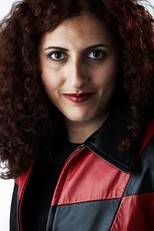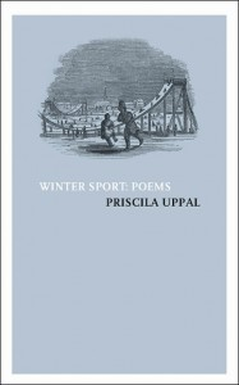 Priscila Uppal Photo by Daniel Ehrenworth Priscila Uppal is a Toronto poet, fiction writer, and York University professor. Among her publications are seven collections of poetry, most recently Ontological Necessities (2006; shortlisted for the $50,000 Griffin Poetry Prize), Traumatology (2010), and Successful Tragedies: Poems 1998-2010 (Bloodaxe Books, U.K.); and the critically acclaimed novels The Divine Economy of Salvation (2002) and To Whom It May Concern (2009). Her work has been published inter-nationally and translated into numerous languages. RUSTY TALK WITH PRISCILA UPPAL Kathryn Mockler: What is your first memory of writing creatively? Priscila Uppal: I remember writing stories about my neighbours. My goal every day was to get myself invited to other people's houses for dinner. I loved watching other people eat and interact with each other. I loved looking through playbins, drawers, medicine cabinets. I was fascinated by people's parents, what they deemed acceptable behaviour or not, what they made for dinner, what gods they worshipped. I honestly think I became a writer because I was pretty nosy about my neighbours. KM: Why did you become a poet? PU: Because I didn't know it was something I could be. I read lots of poems and felt at home inside the language of poetry—metaphor, ambiguity, utterance. Then I started writing them. I wrote poems as a teenager almost every single day, and I haven't really stopped. I went to university because I soon learned that I could actually get scholarship money to read and write poetry and other books all day. That seemed too good to be true—criminal even. So, I took advantage of it. And I suppose I still am. KM: Could you describe your writing process? (Do you write every day? When? Where? How do you approach revision, etc.) PU: I probably do engage in writing every day but the type varies. I write poetry, fiction, creative non-fiction, plays, essays, articles, lectures, even interviews. I tend to write in one form while I am editing another. This kind of cross-pollination, I think, keeps my brain firing in interesting ways. I always work on more than one project at once. That way if I'm stuck or bored, I will switch to another project until I figure a few things out and can return with renewed energy. KM: Rejection or criticism can often stop poets before they start. Do you have any advice on how to deal with rejection? PU: I listen to criticism if it comes from a trusted or intelligent source. I then try to figure out if I think it's fair or valid or something to ponder while I write other work. But I don't listen to rejection. If a magazine or publisher doesn't want my work, that's fine, then it's not the right place for the work. Sometimes the hardest part of publishing is figuring out where a piece will find a home. If you consider that phrase "finding a home," it's apt because if you're someone who knows what it's like to be on your own (I left home at 15, and so know this quite well), then it doesn't seem strange that you might not find the perfect place right away. KM: What poets or writers would you recommended to an aspiring poets? Or what writers were influential to you when you first started out? PU: I think it's hard to sort through all the stuff out there. Every aspiring poet probably already has some favourite poets, so I might suggest finding out who those poets read and liked and who they were reacting against to get a sense of how a poet works within the world of poetry. I think it's important to read widely and internationally and that if you don't have people in your circle who can recommend writers that might be of particular interest to you in terms of what you might already be writing and reading, then taking a class can help draft a new reading list and bibliography. I discovered lots of writers through taking courses and those teachers recommending more writers to me. KM: What is the best thing about being a writer and what is the worst thing? PU: The best thing about being a writer is that I can work almost anywhere. My favourite place to work is beachside in Barbados. I write for hours in the morning, then run on the beach, then make notes and read all afternoon and swim. I can't think of a better life than that. The worst thing about being a writer is that everyone asks you what you really do for a living. I was hired by the university as a poet. I teach poetry and other arts. I tell people that I might not make all my money through book royalties, but I do indeed make my living as a writer KM: Your funniest literary moment, if you have one. PU: One of the funniest was in Sri Lanka at the Galle Literary Festival (a wonderful and warm festival by the way, in a beautiful old Dutch fort town). The opening reception was on this glorious property on a hill and sponsored, in part, by the government of Sri Lanka. As we walked in, young Sri Lankan boys played bagpipes, dressed in Scottish outfits. An orchestra of other young people in elaborate school uniforms played on the grass. Champagne flutes of lime juice were passed around and plates of warm nibbles. At the end of the reception, as we were to talk to the next venue for the evening, further down the hill, a flurry of fireworks exploded. They were so unexpected and near to us that many of us screamed, held our hearts, and tried to steady ourselves as we laughed in both amusement and fear. The fireworks kept coming. Louder. Closer. Bits of fire fell directly in front and behind us the entire time. In order to contain our fear, many of us laughed, and kept laughing. When it was finally over, we writers all looked at each other in relief, trying to figure out if this was the usual welcome for writers for the festival. KM: What are you working on now? PU: I'm just about to leave for London to resume my position as Canadian Athletes Now Poet-in-Residence during the 2012 Olympics and Paralmpics. I'll be writing and publishing two poems per day, one on the Canadian Athletes Now website and one on the Literary Review of Canada website (under Poet's Corner). I will also be posting an article every two days on the LRC website about sports art. This is a project I am very passionate about—encouraging sport and artistic practice, breaking down stereotypes between the sports and arts worlds, and bringing poetry to new audiences in a fun and exciting way. I will be working on the companion to Winter Sport: Poems, called fittingly Summer Sport: Poems, to be published in early 2013. Follow Priscila Uppal |
Rusty Talk
Rusty Talk Editor: Archives
November 2017
Categories
All
|


 RSS Feed
RSS Feed
